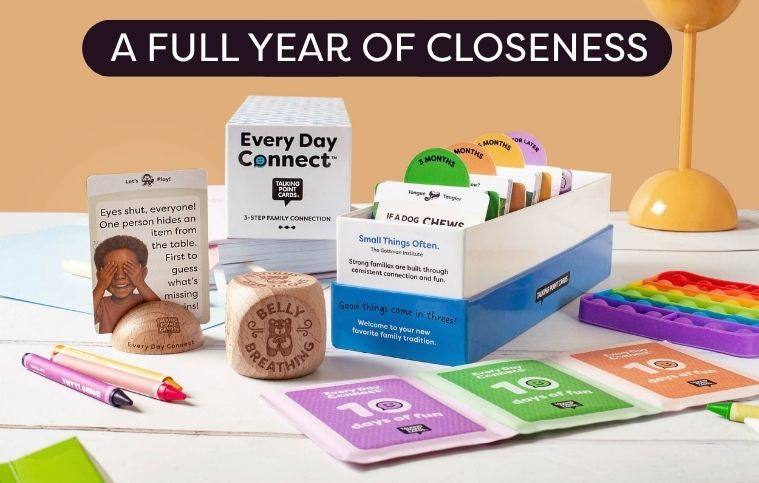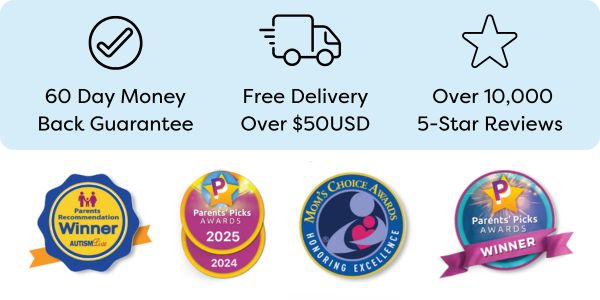SHOP
About
Finding Strength in Adversity
How Meaningful Conversations Can Help You and Your Family Bounce Back from Tough Times

Life has this funny way of throwing curveballs when you least expect them. One day everything's sailing smoothly, and the next? BAM! You're dealing with job loss, health issues, relationship struggles, or any of the million other challenges that make up this wild ride we call life. But here's the thing - the secret weapon that helps people bounce back isn't some fancy self-help program or expensive therapy (though those can definitely help). It's something way simpler and more powerful: meaningful conversations.
Why Getting Through Tough Times is Harder Than Ever
Let's be real for a second. We're living in an age where "connection" usually means scrolling through social media or sending emoji-filled texts. Sure, you might have 500+ LinkedIn connections and a bazillion Instagram followers, but when was the last time you had a deep, soul-nourishing conversation with someone you care about?
The irony is painful - we're more "connected" than ever, yet meaningful communication seems to be going extinct faster than polar ice caps. And that's a huge problem when life decides to play hardball.
The Science Behind Why We Need to Talk
Here's something cool - researchers have found that meaningful conversations literally change your brain chemistry. When you open up and connect with others during tough times, your body releases oxytocin (the "feel-good" hormone) and reduces cortisol (the stress hormone). It's like your body's natural stress-management system, and it's totally free!
"The most basic of all human needs is the need to understand and be understood. The best way to understand people is to listen to them."
- Ralph Nichols

Getting Started: Breaking Down the Conversation Barriers
The Awkward First Step
Nobody likes to make themselves vulnerable (unless you're one of those rare unicorns who actually enjoys sharing feelings). But here's the truth - starting these conversations is like jumping into a cold pool. The anticipation is way worse than actually doing it.
Some practical ways to break the ice:
-
Start with "I've been thinking about..." rather than diving straight into heavy stuff
-
Choose a neutral setting - maybe during a walk or while doing dishes together
-
Pick someone you trust (duh, but seriously)
-
Don't wait for the "perfect moment" - it doesn't exist
Creating Safe Spaces for Real Talk
Think about it - when was the last time you felt truly heard? Not just nodded-at-while-someone-checks-their-phone heard, but really, deeply understood? That's what you want to create for your family members (and yourself).
The Art of Actually Helpful Conversations
Listen Like You Mean It
This isn't your standard "nod and smile" listening. We're talking about the kind where you're so focused on understanding the other person that you forget to check your phone for a solid 20 minutes (gasp!).

Tips for next-level listening:
-
Put away distractions (yes, ALL of them)
-
Use those eyebrows - show you're engaged with facial expressions
-
Ask follow-up questions that show you're really tracking
-
Resist the urge to immediately solve problems
Finding the Right Words (When There Are No Right Words)
Sometimes life serves up situations where no words seem adequate. Maybe your teenager's going through their first heartbreak, or your partner just lost their job. In these moments, it's tempting to fall back on clichés like "everything happens for a reason" (please don't).
Instead, try:
-
"I'm here with you in this"
-
"That really sucks, and I'm sorry you're going through it"
-
"You don't have to figure this out alone"
-
"Want to talk about it, or should we just sit together for a while?"
-
Building Resilience Through Shared Stories
The Power of "Me Too" Moments
There's something magical that happens when someone shares a struggle and another person says, "Me too." Suddenly, the universe feels a little less hostile. These shared experiences create bridges between people that can support heavy emotional traffic.
Creating a Family Narrative
Research shows that families who share stories about overcoming adversity raise more resilient kids. It's like creating a family playbook for handling tough times. "Remember when mom lost her job and we all pitched in?" becomes part of your family's resilience story.
When Professional Help Makes Sense
Look, sometimes DIY approaches aren't enough, and that's completely okay. There's zero shame in bringing in a professional to help navigate particularly rough waters. Think of it like calling a plumber for a major leak - sure, you could try to fix it yourself, but sometimes expertise really helps.
Signs it might be time for professional support:
-
Conversations keep hitting the same wall
-
Someone's struggling with depression or anxiety
-
Family dynamics feel stuck in negative patterns
-
You're dealing with trauma or major life changes
Digital Tools: Friend or Foe?
Making Technology Work for You
While face-to-face conversation is gold standard, technology can actually help facilitate meaningful communication when used intentionally. Video calls, family group chats, or even shared digital journals can keep conversation flowing when in-person isn't possible.

Just remember:
-
Technology should supplement, not replace, real conversation
-
Set boundaries around device use during family time
-
Use apps that encourage meaningful interaction rather than surface-level engagement
Practical Conversation Starters for Tough Times
Questions That Open Doors
Sometimes the hardest part is knowing where to begin. Here are some conversation starters that can help:
-
"What's been the hardest part of this for you?"
-
"What do you need most right now?"
-
"What's one small thing that might help you feel better?"
-
"Can you help me understand what you're feeling?"
Creating Regular Check-in Rituals
Making conversation a habit helps prevent emotional pile-ups. Some ideas:
-
Sunday family dinners with phones banned
-
Weekly walking dates with individual family members
-
Morning coffee check-ins
-
Bedtime "high-low" sharing
The Long Game: Building Lasting Communication Skills
Teaching Kids the Art of Conversation
One of the greatest gifts you can give your kids is the ability to communicate effectively during tough times. Model good communication, teach active listening, and create safe spaces for them to practice these skills.
Maintaining Momentum When Things Get Better
Here's the tricky part - keeping those communication channels open when the crisis passes. It's like exercise - you can't just do it when you're trying to lose weight for a wedding. The real benefits come from consistent practice.
Your Family's Communication Toolkit
At the end of the day, meaningful conversations are like emotional duct tape - they can help hold things together when life gets messy. The key is starting before you need them, practicing regularly, and creating an environment where everyone feels safe sharing their struggles.
Remember:
-
Perfect conversations don't exist
-
Start small but start somewhere
-
Keep showing up, even when it's awkward
-
Build your support network before you need it
The next time life throws a curveball (and it will), you'll have something better than a self-help book or a motivational Instagram quote - you'll have real, meaningful connections with the people who matter most.
LIKED THIS ARTICLE?
SIGN UP FOR MORE!






